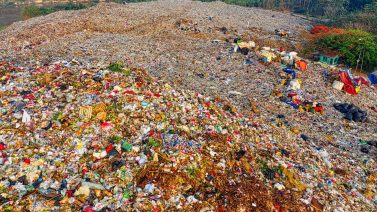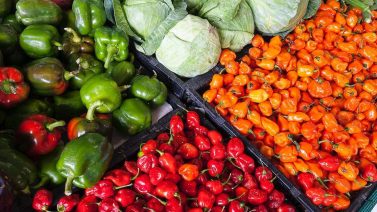Why Go Green?
Besides saving the world, you mean?
Save the Planet
Because let’s face it, Mars isn’t ready for us yet. Plus, have you tried their coffee? Terrible!
Reduce & Reuse
Think of it as giving your trash a second chance at life. Everyone loves a good comeback story!
Community Impact
Join thousands of eco-warriors making Earth cool again (but not too cool – we’re working on that whole global warming thing)
Save Money
Turn your wallet green while going green! Reusable products mean less spending. It’s like getting a high-five from your bank account!
Better Future
Because your grandkids deserve to see real butterflies, not just butterfly emojis. Let’s make sure they inherit more than just our Netflix password!
Healthier Living
Less toxins, more good vibes! Your body will thank you, and so will your houseplants. It’s like a spa day for your lifestyle!
Latest Articles
Why Recycling is More Important Than Ever: Addressing the Global Waste Crisis
As Global Waste Crisis is becoming more and more serious,resource recycling is a vital practice that can aid in safeguarding the environment and preserving natural resources. Recycling involves transforming waste…
What Material Is More Eco-Friendly Than Plastic?
Plastic pollution is one of the biggest environmental concerns facing the world today. With plastic taking hundreds of years to decompose, it is essential that we find an eco-friendly alternative…
Which Materials Are Not Eco-Friendly?
In today’s world, environmental sustainability has become a major concern. As consumers become more environmentally conscious, they are seeking products that are not only of high quality but also environmentally…
What Are Eco Materials?
Eco materials, also known as environmentally friendly materials, are substances that are sourced, processed, and used in a manner that minimizes their impact on the environment. They are designed to…
What Material Is Biodegradable?
Biodegradable materials are those that can be broken down into natural substances by the action of living organisms, such as bacteria and fungi. These materials are becoming increasingly popular as…
What Are 10 Examples Of Eco Material?
The world is facing a major environmental crisis and it is high time we take steps to reduce our carbon footprint. One way we can do this is by using…
Eco-Friendly Flower Preservation: How To Keep Your Blooms Beautiful
Flowers are beautiful, but they don’t last forever. Fortunately, there are several ways to preserve them so you can enjoy their beauty for longer. If you’re looking for an eco-friendly…
Eco-Friendly Flowers: A Sustainable Approach To Floristry
Eco-friendly flowers are gaining popularity as people become more conscious of the environmental impact of the floral industry. These flowers are grown and harvested using sustainable methods that minimize harm…
5 Advantages Of Organic Farming
Organic farming offers a range of benefits that promote environmental sustainability, human health, and biodiversity. In this comprehensive article, we will delve into the five key advantages of organic farming…
Eco-Amazing Products
Save the planet in style!

Magic Shopping Bag
Holds more groceries than Mary Poppins’ bag! Durable, Eco-Friendly Recyclable, Washable, Foldable, Portable Tote Bags Bulk

Bamboo Cutlery Set
Plastic-free and panda-approved! 🐼 Pre Rolled Napkin and Bamboo Cutlery Set. Biodegradable Wrapped Cutlery for Party, Wedding, Events

Forever Water Bottle
Owala FreeSip Insulated Stainless Steel Water Bottle with Straw for Sports, Travel, and School BPA-Free Sports Water Bottle, 24 oz, Denim

Sun Power Bank
Portable Charger,Solar Power Bank,External Battery Pack 5V3.1A Qc 3.0 Fast Charger Built-in Super Bright Flashlight

Smart Plant Pot
Ai Planter, Intelligent Flowerpots, Multiple Expressions, 7 Smart Sensors, and Ai Chips Make Raising Plants Easy and Fun for Living Room

Magic Laundry Eggs
Clean clothes without chemicals! Works like magic. Natural cleaning pellets for laundry, chemical-free, hypoallergenic, safe for all fabrics.

Beeswax Food Wraps
The bees approve this message. Eco Friendly Beeswax Wraps for Food, Sustainable Food Storage Containers, Organic Cotton Food Wraps, Honeycomb

Musical Shower Timer
Turns your shower into a 5-minute concert! Save water while jamming out. Digital Timer Water Proof Shower Timer Shower Clock Bathroom Kitchen Timer
Eco Tips & Tricks
Small changes, big impact!
🚰 Water Saving Tips
- • Turn off the tap while brushing (save 6L/min!)
- • Fix those leaky faucets (drip drip = bye bye water)
- • Collect rainwater for plants (they prefer organic anyway)
⚡ Energy Saving Hacks
- • LED bulbs (because they’re bright ideas)
- • Unplug unused devices (they’re energy vampires!)
- • Use natural light (sun’s still free, last we checked)
♻️ Waste Reduction
- • Compost food scraps (worms need food too!)
- • Say no to straws (save the turtles! 🐢)
- • Bring your own bag (be a shopping superhero)
🌱 Garden & Food Tips
- • Start a windowsill herb garden (Fresh herbs that didn’t travel further than your arm’s reach!)
- • Plan your meals weekly (Because your vegetables deserve better than becoming science experiments)
- • Try Meatless Mondays (Your taste buds get to explore, and cows get to take a day off!)
🏠 Home Office Hacks
- • Use digital notes (Save trees and never lose your notes again – win-win!)
- • Set up a recycling station (Make Marie Kondo proud with organized waste)
- • Choose rechargeable batteries (They keep going and going, just like your coffee addiction)
🛍️ Shopping Smart
- • Buy local seasonal produce (Support farmers and get the freshest ingredients – your taste buds will thank you!)
- • Choose bulk bins (Less packaging, more savings, and the satisfaction of perfect portion control)
- • Repair before replacing (Give your stuff a second chance at life – everyone loves a comeback story!)
🧺 Laundry Wisdom
- • Wash in cold water (90% of energy goes to heating – let’s keep it cool like your style)
- • Air dry when possible (Free solar-powered dryer, aka sunshine!)
- • Use eco-friendly detergents (Clean clothes shouldn’t mean dirty rivers)
🚗 Travel & Transport
- • Combine your errands (Be like a superhero – save time and the planet in one trip)
- • Maintain proper tire pressure (Happy tires = happy planet = happy wallet)
- • Choose public transport (Let someone else drive while you catch up on your reading!)
📱 Tech & Gadgets
- • Enable power-saving modes (Your devices need beauty sleep too!)
- • Recycle old electronics (Give your old phone a chance to become someone’s new treasure)
- • Use smart power strips (Because vampire energy is so last century)
Fun Eco Facts
Because knowledge is power! ⚡
Did You Know? 🤔
- •A single plastic bag can take up to 1,000 years to decompose (That’s longer than your Netflix watchlist!)
- •Recycling one aluminum can saves enough energy to run your TV for 3 hours (Perfect for binge-watching eco documentaries!)
- •The average person generates 4.4 pounds of trash per day (That’s the weight of a small cat!)
Green Heroes 🦸♂️
- •Trees are like Earth’s air purifiers – one tree can absorb up to 48 pounds of CO2 per year!
- •Bees pollinate 1/3 of our food crops (They’re the real MVPs of agriculture!)
- •Mushrooms can help clean up oil spills (Nature’s cleanup crew!)
Ocean Wonders 🌊
- •Seahorses are the only fish species where males give birth (Talk about modern parenting!)
- •An octopus has three hearts and blue blood (They’re basically living sci-fi characters!)
- •A single whale can sequester 33 tons of CO2 in its lifetime (Nature’s climate change fighter!)
Forest Facts 🌳
- •Trees can communicate and share nutrients through an underground fungal network (It’s like nature’s Internet!)
- •The oldest tree in the world is over 5,000 years old (Older than the pyramids!)
- •A single large oak tree can produce enough oxygen for four people to breathe for a year (Nature’s breathing buddy!)
Animal Superheroes 🦸♀️
- •Prairie dogs have their own language with different words for different predators (They’re tiny linguists!)
- •Sloths can hold their breath for up to 40 minutes underwater (Olympic swimmers, watch out!)
- •Butterflies can taste with their feet (The ultimate food critics!)
Earth’s Surprises 🌍
- •Desert plants can remain dormant for years until rain arrives (Nature’s ultimate patience game!)
- •Lightning strikes help plants grow by creating nitrogen in the soil (Mother Nature’s fertilizer!)
- •Banana plants are actually herbs, not trees (The world’s largest herb!)
Insect Intelligence 🐝
- •Ants can lift up to 50 times their body weight (That’s like you lifting a car!)
- •Some crickets can tell the temperature by counting chirps (Nature’s thermometer!)
- •Honeybees do a special dance to tell others where to find food (Better than GPS!)
Plant Power 🌱
- •Bamboo can grow up to 35 inches in a single day (The Usain Bolt of plants!)
- •Some plants can recognize their siblings and share more resources with them (Family first!)
- •Venus flytraps can count to five (Who needs math class?)
Water Wonders 💧
- •A jellyfish is 95% water (Talk about staying hydrated!)
- •Water can exist in three states at the same time – it’s called the triple point (Overachiever much?)
- •Hot water can freeze faster than cold water – it’s called the Mpemba effect (Mind = blown!)
Earth’s Records 🏆
- •The Great Barrier Reef is the largest living structure on Earth (Coral city life!)
- •The Sahara Desert can occasionally experience snow (Winter wonderland in the desert!)
- •The Amazon rainforest produces about 20% of the world’s oxygen (Earth’s biggest air purifier!)








